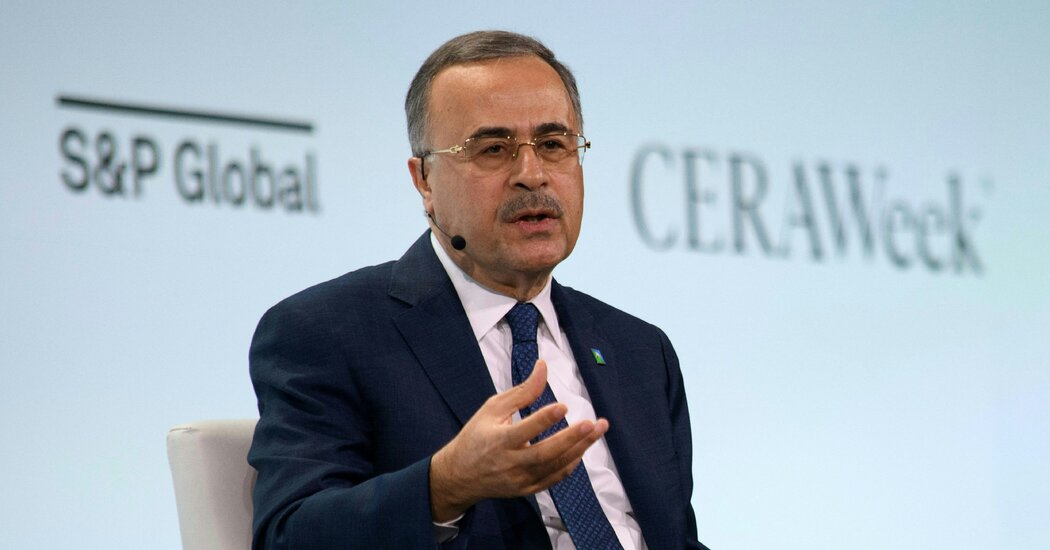To some, it seemed as if the oil executive had loudly muddied the quiet sector.
“We have to give up the fantasy of phasing out oil and gas,” said Amin Nasser, the head of Saudi Aramco, the world's biggest oil producer.
The energy transition was “visibly failing,” he added, saying that predictions about the impending demand for oil and gas were flat-out wrong. A room full of fossil fuel industry representatives greeted the announcement with applause at a conference in Houston.
Mr. Nasser's comments spoke to sharply diverging visions of what role fossil fuels will play in the global economy over the coming decades. Burning fossil fuels is a major driver of climate change.
The oil industry claims that its products, particularly oil and natural gas, will dominate the coming decades. And with this in mind, it invests in new development, particularly in the gas sector.
On the other hand, the International Energy Agency, considered one of the leading authorities on the matter, projects that demand for oil and gas will peak by 2030 as sales of renewable energy and electric vehicles grow exponentially thanks to incentives and subsidies. Just a few months ago, at the largest annual climate summit, negotiators from nearly every country in the world agreed to move “away from fossil fuels.”
In an interview with the Times last year, IEA chief executive Fatih Birol said he believed the likes of Mr Nasser were not seeing the whole picture. “I have a subtle suggestion for the oil executives, they are only talking to each other,” he said. “They need to talk to automakers, the heat pump industry, the renewable energy industry, investors and see what they all think the future of energy looks like.”
However, Mr Nasser suggested in a speech in Texas this week that it was the IEA that had misread the markets by focusing too much on rich countries and ignoring the huge growth in energy demand expected in emerging countries in Asia and Africa. : to industrialize
His response was, in essence, to ask if the IEA thought oil and gas companies were throwing their money away by investing trillions of dollars in combined exploration, drilling and infrastructure additions. “Peak oil and gas is unlikely to come anytime soon, let alone 2030,” Mr. Nasser said, speaking at the CERAWeek by S&P Global conference. “Nobody seems to be betting the farm on it.”
While they spoke less bluntly at the conference, the chief executives of Shell, Exxon Mobil and Brazil's state oil company Petrobras echoed Mr Nasser's words. In an interview with the Times earlier this month, Petrobras CEO Jean-Paul Prates said he sees Brazil's oil production increasing for decades to come.
Shell CEO Wael Sawan said his forecast hinged on fast-growing Asian markets. The same analysis backs up last year's predictions by OPEC, the global oil cartel, that oil demand will not peak until 2045 at the latest.
The White House stands next to the IEA
“The head of Saudi Aramco said he believes the demand estimates from the IEA and others are wrong,” John Podesta, President Biden's senior adviser on international climate policy, told reporters on Tuesday. “We don't think so. We believe there is a strong demand for electrification.”
Even as electrification picks up in some parts of the US economy, US crude oil and liquid natural gas exports are set to hit record levels in 2023. Wind and solar currently supply less than 4 percent of the world's energy. An even smaller percentage of vehicles produced are partially or fully electric.
Natural gas in particular has seen tremendous growth and is more involved in global energy trade than ever before. The technique of fracking paved the way for the US to become the world leader in gas production.
Traditional oil producers in the Persian Gulf, including Saudi Aramco, are also heavily involved in gas production, and none more so than Qatar's national oil and gas company, QatarEnergy. Its plans will allow it to overtake the United States in production after 2030. At a recent press conference, QatarEnergy CEO Saad al-Kaabi told reporters that “we still think there is a great future for gas at least 50 years from now. »
Even if oil demand begins to decline, companies will still need to invest to prevent the decline of existing oil fields, said TotalEnergies CEO Patrick Pouyanne.
Without that investment, he argued, energy markets, which determine the prices people pay for all kinds of basic needs, would begin to fluctuate wildly. Like other oil executives, he did not see renewables and the electrification of transportation growing fast enough to replace existing demand for fossil fuels, let alone in countries with rapidly growing populations and fossil fuel-dependent industries.
“The natural decline of oil fields is about 4 percent per year, so we need to continue to invest in oil and gas fields” to maintain current production levels, he said. “Otherwise, the price will go up and people will be extremely angry.”

